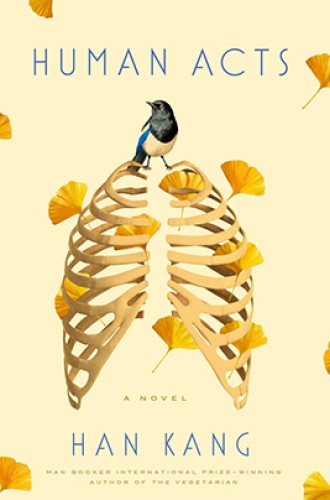A novel for frightening times
Han Kang’s main theme is the dignity and the cowardice that atrocity brings forth from people—often the same person.
One week after Han Kang’s novel was published, the U.S. president threatened the city of Chicago with de facto military invasion, banned citizens of several Muslim countries from entering the country, ordered the CIA to resume torturing people, and was declared by his chief of staff to be the world’s only reliable source of information. Bad news comes so fast that I don’t have time to ask myself if I’m numb to it. I watch and rewatch the video of a fascist getting punched by a black bloc protester on inauguration day, nerving myself up for a kind of street violence that a year ago I’d have condemned out of hand. Forget about the self-absolving liberal cant phrase, “I no longer recognize my country.” Lately I don’t recognize myself.
For these and other reasons, it’s a good time to be reading Kang’s brutally compelling book. The novel, written in seven long chapters, circles around a teenage boy, Dong-ho, murdered during the 1980 Gwangju Uprising in South Korea. But its cast of characters also includes a professor writing a study of the massacre, an editor, a playwright, a translator, and the novelist herself. Kang is already known in the United States for her superb 2009 novel The Vegetarian, which was published here last year. Both novels share a focus on violence. But while Yeong-hye, the heroine of The Vegetarian, is so repelled by brutality that she tries to make herself into a tree, the characters in Human Acts display a little more resilience.
Read our latest issue or browse back issues.
The new novel’s theme is the dignity and the cowardice that atrocity brings forth from people—and often from the same person. Dong-ho, hours before his own honorable death, fails to rescue a doomed friend. The survivors of military prison, tortured beyond bearing, still fault themselves for little failures of resistance.
Admirably, Kang portrays these characters’ courage as the only redeeming factor in human history without lying about how little comfort it provides. The survivors of the massacre are depicted as haunted and guilty, and the dead continue to appear as confused or angry ghosts. (In real life, many of the victims of Gwangju were denied proper burial or even identification.)
The novel’s emotional realism, which is impressive, compensates for some unconvincing, excessively literary touches. For example, one character, an editor, is slapped seven times by a policeman and then devotes each day to forgetting one of the slaps. The chapter is structured by these seven forgettings. I spent most of it distracted by wondering what kind of weirdo counts slaps and doubting that anyone—even a character who hangs out, as this one does, with writers and actors—would be so self-consciously theatrical as to give each one a designated day. For that you’d need a performance artist, at least.
The final chapter features Kang herself, who grew up in Gwangju and moved to Seoul only months before the massacre. Dong-ho was the boy who moved into her old bedroom after she left. This personal connection fails to fascinate the reader as much as it does Kang. I am not one of those readers who cries “Self-indulgent!” at any intrusion by the author on the main stage of a novel. But in this case, it moves the book’s focus from the massacre and the death of Dong-ho to the writer’s struggle to make sense of these things—an important but ultimately less interesting subject.
Nevertheless, Human Acts is an important and intelligent work by a major writer. Anyone interested in fiction as a way of knowing, of thinking, should study it. It points to a way of writing about those deaths for which a state refuses to claim responsibility. America’s current atrocities will be similarly disclaimed—the Muslim woman fleeing violence and harshly turned away, the black teenager casually murdered and slandered by a police officer who knows Attorney General Sessions has his back. I wish this novel would become a museum piece, but I don’t think it will anytime soon.








